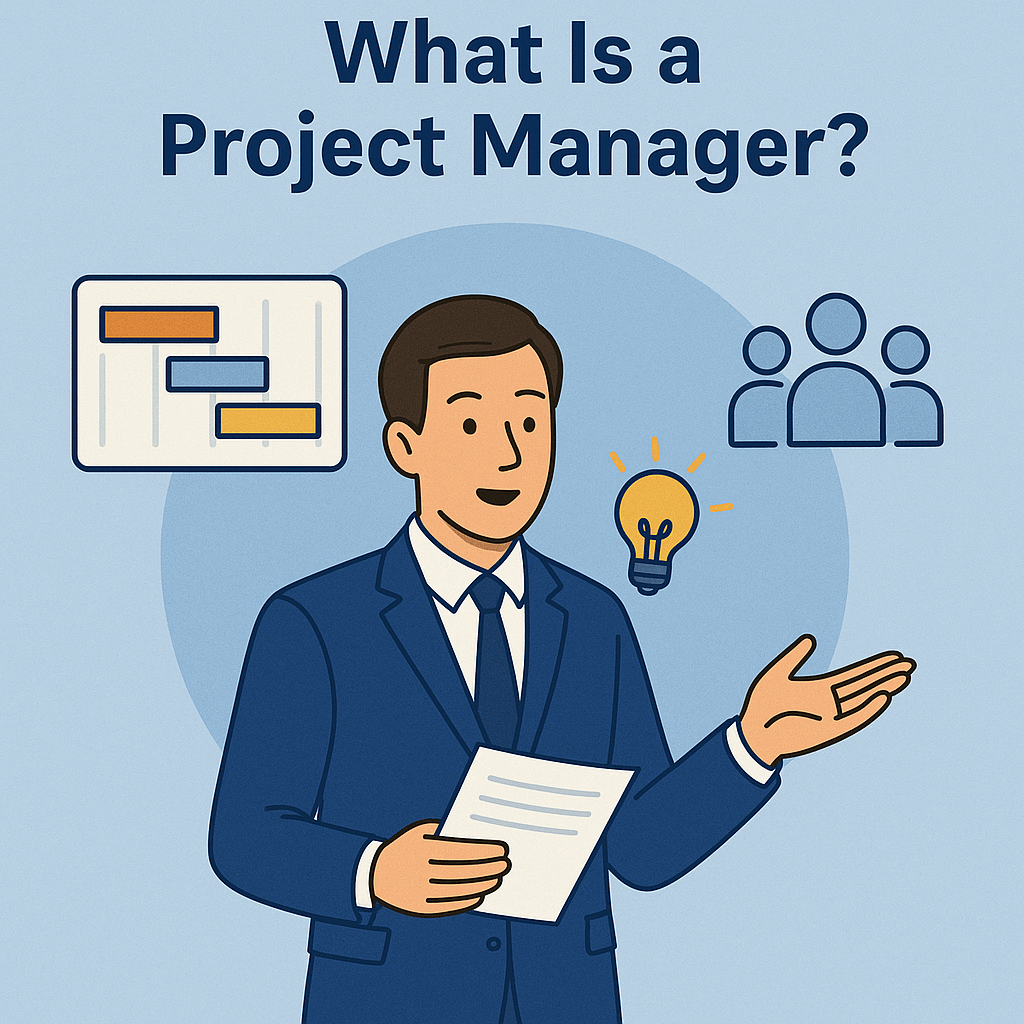Most project managers didn’t grow up dreaming of Gantt charts. In fact, if you ask many professionals how they got into the field, they’ll often say, “I just fell into it.” And that’s no surprise. Project management is one of the few careers that attracts people from all backgrounds because it blends technical skills with something even more valuable: people skills.
At Project SoftSkills, we believe the best project managers are more than organizers—they’re empathetic leaders, persuasive communicators, and adaptable thinkers. Whether you’re planning your first step into the profession or wondering how to make the leap from a related role, this guide is your roadmap.
What Is a Project Manager?
A project manager is someone who turns ideas into results. They lead projects from start to finish, working across teams to ensure that objectives are met on time, within budget, and to the expected standard. While project types may vary—from SEO campaigns to software rollouts—the role stays consistent: deliver value through coordination, leadership, and communication.
You might already be doing project management without the title. If you’re a digital marketing manager organizing cross-functional teams or an account manager planning deliverables, you’re exercising PM muscles every day.

What Does a Project Manager Do?
A day in the life of a project manager could include:
- Running a morning stand-up or sprint planning session
- Writing up status reports for stakeholders
- Managing tools like Jira, Asana, or Trello
- Facilitating problem-solving sessions
- Booking team resources and reviewing timesheets
- Delivering presentations and client updates
But here’s the real job: keeping people aligned, calm, and focused when chaos strikes. It’s not about bossing people around—it’s about helping them do their best work.

Must-Have Project Management Skills
Practical (Hard) Skills
- Time and cost estimation
- Scheduling and planning
- Risk and change management
- Documentation (SOWs, RAID logs, RACI charts)
- Familiarity with tools like Jira, Confluence, Asana, MS Project
Personal (Soft) Skills
- Communication
- Leadership and motivation
- Conflict resolution
- Adaptability
- Organization
- Critical thinking
Want to boost your team leadership fast? Explore our course: Stronger Together: Building Resilient Teams.
Do You Need a Certification?
Not always. Certifications like PMP, PRINCE2, CAPM, and Scrum Master can boost your credibility and salary, but many PMs succeed through real-world experience and continuous learning.
If you’re just starting out, consider the CAPM or an Agile foundational course. These help you learn vocabulary and show commitment.
How to Become a Project Manager (8 Steps)
- Assess Your Transferable Skills – Leadership, time management, and communication matter more than your degree subject.
- Get Educated – A business or communications degree helps, but isn’t essential. Online courses are also a strong entry point.
- Build Real Experience – Volunteer, freelance, or manage internal projects at your current job.
- Learn the Tools – Get comfortable with tools like Jira, Trello, Basecamp, or Monday.com.
- Understand Methodologies – Read up on Waterfall, Scrum, and Hybrid models. Start to identify which suits your working style.
- Join a Community – Network through PMI, LinkedIn groups, or local meetups.
- Tailor Your Resume – Emphasize outcomes, not tasks. Use PM language even for non-PM roles.
- Practice for Interviews – Prepare examples of how you handled conflict, led teams, and solved problems under pressure.

Is Project Management Right for You?
Pros:
- Great pay and career progression
- Varied daily tasks and industries
- Flexibility (remote and freelance options)
- Deep sense of accomplishment
Cons:
- Stressful and deadline-driven
- Requires constant learning
- May lack recognition
- You’re responsible when things go wrong
If you thrive on bringing order to chaos and get joy from helping others succeed, project management could be your perfect fit.
Get Started with Project SoftSkills
At Project SoftSkills, we specialize in turning capable professionals into confident project leaders. Explore our suite of soft skill-focused online courses designed for real-world impact:
You may not have grown up wanting to be a project manager. But you might just be perfect for it.


0 Comments